| Listing 1 - 8 of 8 |
Sort by
|
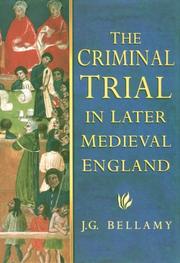
ISBN: 0802042953 Year: 1998 Publisher: Toronto : University of Toronto press,
Abstract | Keywords | Export | Availability | Bookmark
 Loading...
Loading...Choose an application
- Reference Manager
- EndNote
- RefWorks (Direct export to RefWorks)
Criminal procedure --- Law, Medieval. --- History
Book
ISBN: 2919979086 9782919979080 Year: 1998 Volume: 10 114 Publisher: Luxembourg : Luxembourg : Centre Luxembourgeois de Documentation et d'Etudes Médiévales (CLUDEM), Section historique de l'Institut Grand-Ducal du Luxembourg,
Abstract | Keywords | Export | Availability | Bookmark
 Loading...
Loading...Choose an application
- Reference Manager
- EndNote
- RefWorks (Direct export to RefWorks)
Law [Medieval ] --- Congresses --- Lotharingia --- History --- Charters, grants, privileges --- Lotharingie --- Histoire
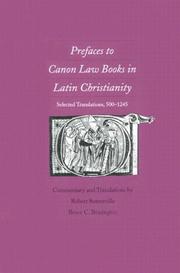
ISBN: 0300071469 Year: 1998 Publisher: New Haven (Conn.): Yale university
Abstract | Keywords | Export | Availability | Bookmark
 Loading...
Loading...Choose an application
- Reference Manager
- EndNote
- RefWorks (Direct export to RefWorks)
Droit médiéval --- Law [Medieval ] --- Medieval law --- Middeleeuws recht --- Prefaces --- Préfaces --- Recht [Middeleeuws ] --- Voorreden --- Voorwoorden --- 348.1 --- Canon law --- -Law, Medieval --- Prologues and epilogues --- Public law (Canon law) --- Law --- Ecclesiastical law --- Rescripts, Papal --- Kerkelijk recht: bronnen --- History --- Catholic Church --- Law, Medieval. --- Prefaces. --- History. --- 348.1 Kerkelijk recht: bronnen --- Law, Medieval
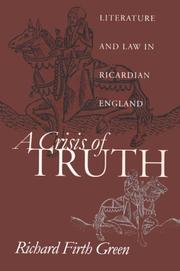
ISBN: 0812234634 Year: 1998 Publisher: Philadelphia (Pa.) : University of Pennsylvania press,
Abstract | Keywords | Export | Availability | Bookmark
 Loading...
Loading...Choose an application
- Reference Manager
- EndNote
- RefWorks (Direct export to RefWorks)
English literature --- Law and literature --- Law --- Law, Medieval, in literature. --- Truth in literature. --- History and criticism. --- History
Book
ISBN: 887988140X 9788879881401 Year: 1998 Volume: 1 Publisher: Spoleto Centro italiano di studi sull'alto Medioevo
Abstract | Keywords | Export | Availability | Bookmark
 Loading...
Loading...Choose an application
- Reference Manager
- EndNote
- RefWorks (Direct export to RefWorks)
Feudal law --- Law, Medieval --- Liber consuetudinum Imperii Romaniae --- Droit féodal --- Feudalism --- Law, Feudal --- Land tenure --- Law --- Law and legislation --- Liber consuetudinum Imperii Romaniae. --- Assizes of Romania --- Uxanze e statuti delo Imperio de Romania --- Assises de Romanie --- Latin Empire, 1204-1261. --- Feudal law - Sources --- Law, Medieval - Sources
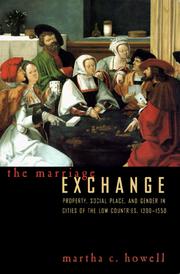
ISBN: 0226355160 0226355152 9780226355160 Year: 1998 Volume: *33 Publisher: Chicago, Ill. University of Chicago Press
Abstract | Keywords | Export | Availability | Bookmark
 Loading...
Loading...Choose an application
- Reference Manager
- EndNote
- RefWorks (Direct export to RefWorks)
Based on extensive research in this archive, this book reveals how these documents were produced in a centuries-long effort to regulate --and ultimately to redefine-- property and gender relations. At the center of the transformation was a shift from a marital property regime based on custom to one based on contract. In the former, a widow typically inherited her husband's property; in the latter, she shared it with or simply held it for his family or offspring. Howell asks why the law changed as it did and assesses the law's effects on both social and gender meanings but she insists that the reform did not originate in general dissatisfaction with custom or a desire to disempower widows. Instead, it was born in a complex economic, social and cultural history during which Douaisiens gradually came to think about both property and gender in new ways. Medieval Douai was one of the wealthiest cloth towns of Flanders, and it left an enormous archive documenting the personal financial affairs of its citizens --wills, marriage agreements, business contracts, and records of court disputes over property rights of all kinds.
History of the Low Countries --- anno 1400-1499 --- anno 1500-1599 --- anno 1300-1399 --- Droit médiéval --- Law [Medieval ] --- Medieval law --- Middeleeuws recht --- Recht [Middeleeuws ] --- Husband and wife --- Marital property --- Law, Medieval --- History --- History. --- Law, Medieval. --- #VCV monografie 1999 --- Droit médiéval --- anno 500-1499 --- France --- Matrimonial property --- Property, Marital --- Property --- Man and wife --- Matrimonial regime --- Spouses --- Wife and husband --- Domestic relations --- Women --- Desertion and non-support --- Marriage law --- Married women --- Law and legislation --- Legal status, laws, etc. --- Flanders (County) --- Douai (France) --- Marital property - Flanders - History --- Husband and wife - Flanders - History --- Marital property - France - Douai - History --- Husband and wife - France - Douai - History --- HUWELIJKSLEVEN -- 930.347 --- MIDDELEEUWEN -- 930.347 --- MODERNE TIJDEN -- 930.347 --- HUWELIJKSLEVEN -- 930.348 --- MIDDELEEUWEN -- 930.348 --- MODERNE TIJDEN -- 930.348 --- MODERNE TIJDEN -- 930.32 --- Marriage --- Matrimonial law --- Book --- Property rights --- Inheritance law
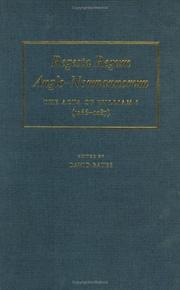
ISBN: 0198206747 9780198206743 Year: 1998 Publisher: Oxford : Clarendon press,
Abstract | Keywords | Export | Availability | Bookmark
 Loading...
Loading...Choose an application
- Reference Manager
- EndNote
- RefWorks (Direct export to RefWorks)
Law --- Law, Medieval --- Droit --- Droit médiéval --- Sources --- England --- Angleterre --- Charters, grants, privileges --- Chartes, privilèges, immunités --- Sources. --- Droit médiéval --- Chartes, privilèges, immunités --- Anglii︠a︡ --- Inghilterra --- Engeland --- Inglaterra --- Anglija --- England and Wales --- Law - England - Sources --- England - Charters, grants, privileges - Sources

ISBN: 1282069942 9786612069949 0226355179 9780226355177 9780226355153 0226355152 0226355152 0226355160 9780226355160 Year: 1998 Publisher: Chicago University of Chicago Press
Abstract | Keywords | Export | Availability | Bookmark
 Loading...
Loading...Choose an application
- Reference Manager
- EndNote
- RefWorks (Direct export to RefWorks)
Medieval Douai was one of the wealthiest cloth towns of Flanders, and it left an enormous archive documenting the personal financial affairs of its citizens-wills, marriage agreements, business contracts, and records of court disputes over property rights of all kinds. Based on extensive research in this archive, this book reveals how these documents were produced in a centuries-long effort to regulate-and ultimately to redefine-property and gender relations. At the center of the transformation was a shift from a marital property regime based on custom to one based on contract. In the former, a widow typically inherited her husband's property; in the latter, she shared it with or simply held it for his family or offspring. Howell asks why the law changed as it did and assesses the law's effects on both social and gender meanings but she insists that the reform did not originate in general dissatisfaction with custom or a desire to disempower widows. Instead, it was born in a complex economic, social and cultural history during which Douaisiens gradually came to think about both property and gender in new ways.
Husband and wife --- Law, Medieval. --- Marital property --- Matrimonial property --- Property, Marital --- Property --- Medieval law --- Man and wife --- Matrimonial regime --- Spouses --- Wife and husband --- Domestic relations --- Women --- Desertion and non-support --- Marriage law --- Married women --- History. --- Law and legislation --- Legal status, laws, etc. --- HUWELIJKSLEVEN -- 930.347 --- MIDDELEEUWEN -- 930.347 --- MODERNE TIJDEN -- 930.347 --- HUWELIJKSLEVEN -- 930.348 --- MIDDELEEUWEN -- 930.348 --- MODERNE TIJDEN -- 930.348 --- MODERNE TIJDEN -- 930.32 --- low countries, gender, marriage, courtship, alliance, social status, mobility, property, wealth, medieval, flanders, douai, cloth, textiles, wills, contracts, business, widows, inheritance, heirs, trust, custom, tradition, offspring, le libert v rohard, law, legislation, courts, reform, nonfiction, history, women, wife, court disputes, douaire coutumier.
| Listing 1 - 8 of 8 |
Sort by
|

 Search
Search Feedback
Feedback About UniCat
About UniCat  Help
Help News
News